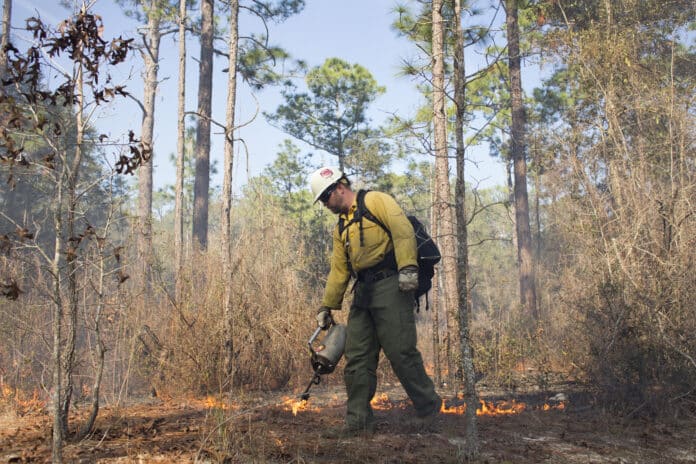By Kirsten Romaguera, UF/IFAS
Adding fuel to the argument to use fire as a healthy forest management tool, University of Florida scientists say important pollinators survive the temporary displacement, while a common disease carrier often loses the battle.
A pair of documents recently posted to EDIS, UF/IFAS Extension’s peer-reviewed online journal, detail bees’ and ticks’ relationships with fire.
“Bees that use forests as habitat either burrow underground or fly out of the fire, and later they benefit from the renewed pollination resources that then have the space to regrow,” said Raelene Crandall, associate professor in the UF/IFAS School of Forest, Fisheries, and Geomatics Sciences. “But ticks need to catch a ride out of the forest, or they can’t escape the flames.”
The document “Bees and Fire: How does Fire in Longleaf Pine Savannas Affect Bee Communities?” summarizes a collection of studies that explains how bees benefit from fires. Bee death during a fire is rare, the document notes, and as the burned area rebounds, the natural flower diversity increases within several months.
Ticks, on the other hand, can be controlled with fire. In the document “Prescribed fire as a tool for controlling tick populations in the Southeastern United States,” Crandall finds compelling reasons to use prescribed fire to intentionally suppress the population of disease-carrying ticks. It wouldn’t eradicate them, but any survivors would also continue to feed opossums, turkeys and other animals one link up the food chain.
“The temperature alone can kill the ticks directly,” said Crandall, who also provided the illustrations in both documents. “But it’s also leaving behind a more open canopy that doesn’t provide a favorable habitat for ticks.”
Florida is seen as a national leader for its prescribed burning efforts, which counter its propensity for lightning strikes and other wildfire threats. But Crandall said the pair of documents tell more of the story, with prescribed fire benefiting the whole forest.
“Prescribed fire is fundamentally changing the ecosystem with a preference toward pollinators instead of ticks,” Crandall said. “That’s important as bees are vital to the regeneration of the forest, as well.”
Ask IFAS, powered by EDIS, is a user-friendly hub of information on topics ranging from gardening to agriculture to family resources. New and revised publications are added regularly and appear on the home page: ask.ifas.ufl.edu.

